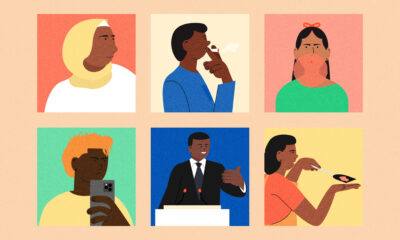Features
“Edo Guys Do This, Calabar Girls Do That!” Shelving Stereotypes & Prejudices to Learn the Interesting Story
 In a multi-ethnic society like ours, its almost impossible not to judge a book by its cover; in fact it does not really matter if you do so, what really matters is that in spite of your prejudices, you give the book the benefit of doubt and the opportunity to prove you wrong! However, the issue is that many people are not willing to take that risk because to them, it seems unnecessary and it is almost akin to expecting feaces not to smell.
In a multi-ethnic society like ours, its almost impossible not to judge a book by its cover; in fact it does not really matter if you do so, what really matters is that in spite of your prejudices, you give the book the benefit of doubt and the opportunity to prove you wrong! However, the issue is that many people are not willing to take that risk because to them, it seems unnecessary and it is almost akin to expecting feaces not to smell.
Some of the most common prejudices regarding tribe include; Hausa men are somewhat dirty with low educational attainment, Ibo men are swindlers albeit having good business sense, Calabar girls are promiscuous albeit being good homemakers, Edo men are bedmatically unrivaled, Edo girls are usually international sex hawkers, Yoruba people love throwing lavish parties, and so on.
However, I realised that much as I do not agree with most of these prejudices, some of them have become ingrained in me over time.Though I am tempted to ask where all these mindsets emanated from, I swallow back the question because I remember this poem that I wrote a while ago which aptly answers the question –
Life is a battlefield
We are walking wounded
Some wounds get healed
Others leave us forever scarred
Gradually we loose our innocence
Trusting ourselves or others make no sense
So we walk though life with our defences
High and formidable like Jericho’s fence
Who is to blame?
We are all prisoners of our experience
Though we can become prisoners of the experiences we have had with people of a particular tribe, we can actually make the conscious effort to give every other person from that tribe the benefit of the doubt and not just lump people into stereotypes because of things other people have done to you.
This is how I learnt this lesson. During my service year when I was at the orientation camp, there was this morning I craved so badly for spicy food and unfortunately what was being served that morning was bread and tea or something like that so I decided to go to mami market to get something else to eat. After checking around for a suitable place to eat, I decided to settle for yam and stew; unfortunately, it was after the food seller had poured the stew on the yam that I discovered that the yam was as cold as a dog’s nose! But I couldn’t let the food go to waste so I decided to eat the yam alone (for reasons best known to my quirky appetite) and push it down my throat with soft drink.
On the table directly in front of me, there were two Hausa guys discussing and one of them was picking his nose (actually he was literally turning eba in his nose with his index finger), picking out the contents and putting into his mouth totally oblivious of the presence of people around who were watching him. So I just decided to totally blank the guy out of my line of vision and continued forcing the stew-less yam down my throat with gulps of soft drink in spite of my disgust. Then he drew the phlegm out of his throat very loudly. I was miffed! I said something nasty which I can hardly remember, got up and left the food.
That singular experience confirmed the mindset I had about Hausa people being not very neat and not very cultured people.It was the mindset I carried until ‘experience’ taught me a very good lesson.
I needed a favour from a certain lady and had to go to her office. I met a scruffy-looking security man who began to bombard me with silly questions all in a bid to let me know that he was influential in his own way. I knew that I might need to go back there the next day to get a feedback from his boss and that I might still need to go through him so I decided to answer his worthless questions politely. The straw that broke the camel’s back was when in reply to his question of “wish state you from come?” I responded “My state of origin is Akwa-Ibom”. He then he gave me this snide wink and said “aha! So you sef sabi do well well? My blood went hot and I was ready to give him a piece of my mind, but I decided against it and just walked away.
I still do not know why that particular experience was really got to me because prior to that time, I had had similar experiences. In fact, many times when I meet some people from other tribes (especially older people) and I mention my name to them, I would sometimes hear a few sarcastic remarks or some would just say “so you be Calabar?” in a snide manner(note that even till today, some Nigerians still think, ‘Calabar’ is an amalgam of Cross River and Akwa Ibom state).
Much as I was made to understand that the reason why ‘Calabar’ ladies are seen in that light is because of the traditional fattening rooms which is peculiar to the Efik culture where young girls are kept in a certain place and fed till they are healthy,taught ‘bedmatics’ and home making skills among other things. Thus ‘Calabar’ ladies are believed to be very good at taking care of men.Then again I heard that seeing as dog meat is eaten regularly in Calabar, and dog meat is believed to give sexual stamina to women who eat it. Thus Calabar women are believed to be women with insatiable sexual appetites. Well, I find the second reason to be to really ridiculous and implausible. In fact, I doubt that security man knows anything about that theory and yet he confers those prejudices on every ‘Ekaete, Imabong and Affiong’ he meets.
But whatever the case maybe, I think it is much fairer to give everyone the benefit of doubt in spite of the stereotypes and prejudices rather than judge every book solely by its cover and miss out on an interesting story!
Photo Credit: 123rf.com























